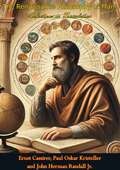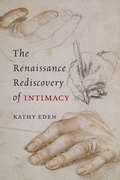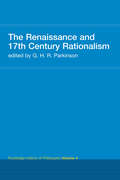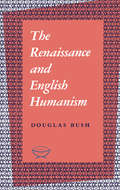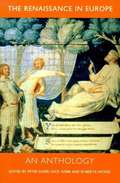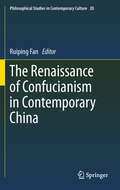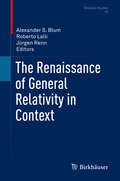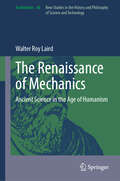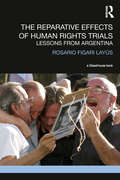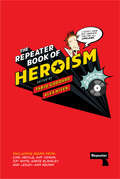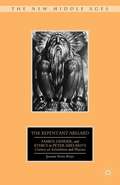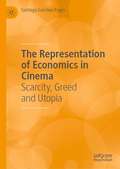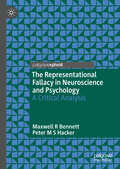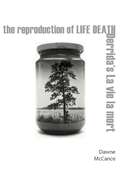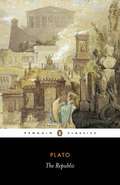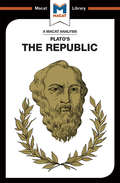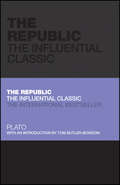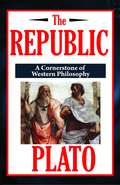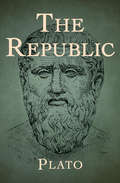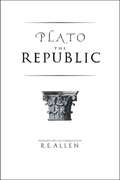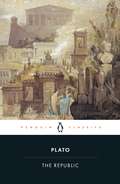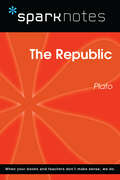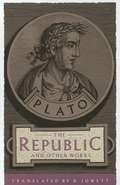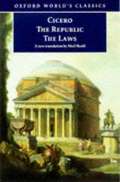- Table View
- List View
The Renaissance Philosophy of Man: Selections in Translation
by Ernst CassirerExplore the profound and transformative ideas of the Renaissance with The Renaissance Philosophy of Man: Selections in Translation. This essential anthology brings together pivotal texts from some of the most influential thinkers of the Renaissance, offering readers a comprehensive insight into the philosophical currents that shaped this remarkable period in history.Edited by renowned scholars Ernst Cassirer, Paul Oskar Kristeller, and John Herman Randall Jr., this collection presents carefully selected translations of key philosophical works that highlight the diverse and dynamic nature of Renaissance thought. The book covers a wide array of topics, from humanism and individualism to the relationship between humanity and the divine.The Renaissance Philosophy of Man features writings from seminal figures such as Petrarch, Pico della Mirandola, Marsilio Ficino, and Giovanni Pontano. Each selection is accompanied by insightful introductions and annotations that provide historical context and clarify the significance of the ideas presented. The editors' scholarly expertise ensures that readers gain a deep and nuanced understanding of the philosophical developments of the time.The anthology delves into the central themes of Renaissance philosophy, including the dignity of man, the potential for human achievement, and the revival of classical learning. These texts reflect the era's optimism and its belief in the power of human reason and creativity. The Renaissance thinkers' quest for knowledge and their engagement with ancient sources laid the groundwork for modern philosophy and science.Join Ernst Cassirer, Paul Oskar Kristeller, and John Herman Randall Jr. in exploring the rich philosophical landscape of the Renaissance. The Renaissance Philosophy of Man offers readers a window into a pivotal era that continues to influence contemporary thought and culture.
The Renaissance Rediscovery of Intimacy
by Kathy EdenIn 1345, when Petrarch recovered a lost collection of letters from Cicero to his best friend Atticus, he discovered an intimate Cicero, a man very different from either the well-known orator of the Roman forum or the measured spokesman for the ancient schools of philosophy. It was Petrarch’s encounter with this previously unknown Cicero and his letters that Kathy Eden argues fundamentally changed the way Europeans from the fourteenth through the sixteenth centuries were expected to read and write. The Renaissance Rediscovery of Intimacy explores the way ancient epistolary theory and practice were understood and imitated in the European Renaissance. Eden draws chiefly upon Aristotle, Cicero, and Seneca—but also upon Plato, Demetrius, Quintilian, and many others—to show how the classical genre of the “familiar” letter emerged centuries later in the intimate styles of Petrarch, Erasmus, and Montaigne. Along the way, she reveals how the complex concept of intimacy in the Renaissance—leveraging the legal, affective, and stylistic dimensions of its prehistory in antiquity—pervades the literary production and reception of the period and sets the course for much that is modern in the literature of subsequent centuries. Eden’s important study will interest students and scholars in a number of areas, including classical, Renaissance, and early modern studies; comparative literature; and the history of reading, rhetoric, and writing.
The Renaissance and 17th Century Rationalism: Routledge History of Philosophy Volume 4 (Routledge History Of Philosophy Ser.)
by G. H. R. ParkinsonThis fourth volume traces the history of Renaissance philosophy and seventeenth century rationalism, covering Descartes and the birth of modern philosophy.
The Renaissance and English Humanism
by Douglas BushThe appearance of a fourth printing of The Renaissance and English Humanism indicated the scholarly success this book has enjoyed for more than a decade. As a brief yet thoughtful and eloquent evaluation of the influence of the Christian humanistic tradition upon our culture it has not been surpassed. The study is divided into four parts: in the first, Professor Bush discusses modern theories of the Renaissance; in the second and third, the character of classical humanism on the Continent and in England; and in the fourth, the place of Milton in the humanistic tradition."Douglas Bush has shown an unusual awareness," wrote Wallace K. Ferguson, "of the historiographical evolution of the Renaissance, and has taken his stand with rare explicitness on the side of those who find the Renaissance filled with mediaeval traditions." Professor Bush sees the dominant ideal of the English Renaissance as rational and religious order, rather than rebellious individualism, and his view has provided an important clue to the English literature and thought of the 16th and the earlier 17th century.
The Renaissance in Europe: An Anthology
by Nick Webb Peter Elmer Roberta WoodCurrent research on the Renaissance has emphasized the need to look again at the original texts, documents and artefacts which, taken together, constitute the primary source of evidence for the re-evaluation of its historical significance. This volume represents one attempt to reflect this renewal of interest in returning to first principles. The Anthology presents a series of carefully selected primary sources across a wide range of disciplines, ordered thematically and reflecting the interests of scholars in a variety of fields of Renaissance studies. There are sections on humanism and its impact on philosophy and politics; Renaissance court culture, with particular emphasis on the courts of northern Italy and the Kingdom of Hungary; poetry and drama in Renaissance Britain; the Reformation; and science, magic and witchcraft. While some of the extracts are short and familiar, others appear here, in translation, for the first time, including, for example, an early sixteenth-century demonology by the Italian humanist Gianfrancesco Pico della Mirandola. The volume is illustrated throughout and each extract is introduced by a brief headnote describing the author and the source.
The Renaissance of Confucianism in Contemporary China
by Ruiping FanA new generation of Confucian scholars is coming of age. China is reawakening to the power and importance of its own culture. This volume provides a unique view of the emerging Confucian vision for China and the world in the 21st century. Unlike the Neo-Confucians sojourning in North America who recast Confucianism in terms of modern Western values, this new generation of Chinese scholars takes the authentic roots of Confucian thought seriously. This collection of essays offers the first critical exploration in English of the emerging Confucian, non-liberal, non-social-democratic, moral and political vision for China's future. Inspired by the life and scholarship of Jiang Qing who has emerged as China's exemplar contemporary Confucian, this volume allows the English reader access to a moral and cultural vision that seeks to direct China's political power, social governance, and moral life. For those working in Chinese studies, this collection provides the first access in English to major debates in China concerning a Confucian reconceptualization of governance, a critical Confucian assessment of feminism, Confucianism functioning again as a religion, and the possibility of a moral vision that can fill the cultural vacuum created by the collapse of Marxism.
The Renaissance of General Relativity in Context (Einstein Studies #16)
by Jürgen Renn Roberto Lalli Alexander S. BlumThis contributed volume explores the renaissance of general relativity after World War II, when it transformed from a marginal theory into a cornerstone of modern physics. Chapters explore key historical processes related to the theory of general relativity, in addition to presenting a thorough treatment of the relevant science behind these episodes. A broad historiographical framework is introduced first, thus providing the broad context in which the given computational approaches and case studies occurred. Written by an international and interdisciplinary group of expert authors, these chapters will bring readers to a more complete understanding of Einstein’s theory. Specific topics include:Social and citation networksThe Fock-Infeld disputeWheeler’s turn to gravitation theoryThe position of general relativity in theories of fundamental interactionsThe pursuit of a quantum theory of gravityThe emergence of dark matter in relation to cosmological modelsInstitutional frameworks for gravitational wave search in EuropeThe Renaissance of General Relativity in Context is ideal for historians, philosophers, and sociologists of science. Students and researchers in physics will also be interested in the topics explored.
The Renaissance of Mechanics: Ancient Science in the Age of Humanism (Archimedes #68)
by Walter Roy LairdThis book gives an account of the origins of theoretical mechanics in antiquity, its limited reception in the Arabic and Latin Middle Ages, and its recovery and subsequent development in Italy to the time of Galileo. From late antiquity to the fifteenth century, the ancient science of mechanics—the theory of machines—was almost completely unknown in the Latin west. Then, from the mid-fifteenth century on, Italian humanists began to recover the ancient texts, and from them through the sixteenth century Italian mathematicians restored the ancient science of mechanics. The Renaissance of Mechanics first examines the principal ancient works on mechanics—the Aristotelian Mechanical Problems, the mechanical geometry of Archimedes, and Hero’s Mechanics—and then describes their limited reception in the Arabic world and their even more limited transmission to the medieval Latin west. It then traces their recovery in the fifthteenth century and their assimilation inthe sixteenth by Niccolò Tartaglia, Francesco Maurolico, and Guidobaldo dal Monte, culminating in Galileo’s rediscovery of Hero’s lost mechanical principles. The book ends with an examination of Galileo’s mechanics and its relation to his new science of motion, and suggests how modern mechanics would emerge from these ancient roots. Detailed analyses of these works offer new insights and interpretations while remaining accessible to general historians. The Renaissance of Mechanics will be of especial interest to those working in the fields of renaissance humanism and the history of ancient, medieval, and renaissance science and mathematics.
The Reparative Effects of Human Rights Trials: Lessons From Argentina
by Rosario Figari LayusJustice in domestic courts is one of the most prominent aims of victims seeking to obtain accountability for human rights violations. It is, however, also one of the most difficult to achieve. In many Latin American countries, as well as elsewhere, activists have put human rights prosecutions forward as a fundamental means to end impunity, build democracy, strengthen the rule of law and address victims’ rights. But there is still little knowledge about what actually happens when these judicial mechanisms are effectively put to work. Can prosecutions of mass human rights violations contribute to overcome the effects of state violence and impunity? Can trials enable meaningful reparative changes for victims in their local contexts? Analysing the human rights trials in Argentina established to prosecute those responsible for human rights violations during the military dictatorship, this book addresses how and why domestic prosecutions can operate as a means for reparation and contribute to dealing with the damage caused by crimes against humanity. Based on a series of interviews conducted with victims participating in these prosecutions, as well as with lawyers, prosecutors, judges and other relevant actors in five provinces of Argentina, this book will be of considerable interest to those studying and working in the interdisciplinary field of transitional justice and human rights. The PhD thesis on which this book was based was awarded with the 2016 Doctoral Studies Award of the Philipps University of Marburg in Germany.
The Repeater Book of Heroism
by Tariq Goddard & Alex NivenIn these impactful first-person essays, a selection of Repeater authors come together to write about what heroism means to them, trying to imagine a new kind of hero figure for the twenty-first century."I don&’t have any heroes, they&’re all useless", opined John Lydon in 1976. As a spokesperson of sorts for the punk generation, Lydon was giving voice to a nihilistic, deconstructive impulse which, for better or worse, would go on to dominate the next half-century or so of intellectual, cultural and political life. But isn&’t one of the problems with the modern world that we no longer have any real sense of what heroism is? What if we recovered heroism from the hands of the fascists and the neoliberal ideologues, and proclaimed that – despite everything – a hero can and should be something to be? In these personal, provocative essays, the authors behind the uncompromising project that is Repeater Books come together to redefine the idea of the hero for a twenty-first-century public which desperately needs something to believe in. From Eric Cantona to Wile E Coyote, Bruno Latour to Paula Rego, forgotten legends and anonymous family members, this compendium of extraordinary human behaviour is essential reading for anyone who has ever thought that, despite what Jean-Paul Sartre said, heaven is other people.
The Repentant Abelard
by Juanita Feros RuysThe Repentant Abelard is both an innovative study and English translation of the late poetic works of controversial medieval philosopher and logician Peter Abelard, written for his beloved wife Heloise and son Astralabe. This study brings to life long overlooked works of this great thinker with analyses and comprehensive notes.
The Representation of Economics in Cinema: Scarcity, Greed and Utopia
by Santiago Sanchez-PagesCinema articulates the economic anxieties of each generation of filmmakers and audiences. It has an influence on people’s views on various economic issues and many orders of magnitude larger than that of economics as a discipline. This book offers a sweeping study of the representation of economics in cinema across a wide range of areas and genres, from the conflicts over resources in the lawless Old West to the post-scarcity societies of science fiction futures. This book studies how films have portrayed trade unions, scarcity, money, businesses, innovators, migrant workers, working women, globalization, the stock market, and the automation of work. It aims to be useful to those who are interested in cinema with economic themes and to those who want to learn about economics through cinema.
The Representational Fallacy in Neuroscience and Psychology: A Critical Analysis
by Maxwell R Bennett Peter M HackerThis book traces the history and coherence of the use of the word ‘representations’ from its origins, particularly in the description of artefacts, to its use in the description of so-called mental and neural representations in the mind and in the brain. It is shown that there are no good reasons for this transition. Experimental psychology is confused in taking what one perceives to be a mental representation. Neuroscientists need to avoid moving readily between the notions of neural and mental representations; indeed even the logic of taking a pattern of neural activity as standing for some sensibly experienced characteristic requires elucidation. It is concluded that the word ‘representation’ when used in experimental psychology and cognitive neuroscience is confounding.
The Reproduction of Life Death: Derrida's La vie la mort
by Dawne McCanceDuring the 1975–76 academic year, Jacques Derrida delivered a seminar, La vie la mort (Life Death), at the École normale supérieure, in Paris. Based on archival translations of this untapped but soon-to-be-published seminar, The Reproduction of Life Death offers an unprecedented study of Derrida’s engagement with molecular biology and genetics, particularly the work of the biologist François Jacob.Structured as an itinerary of “three rings,” each departing from and coming back to Nietzsche, Derrida’s seminar ties Jacob’s logocentric account of reproduction to the reproductive program of teaching that characterizes the academic institution, challenging this mode of teaching as auto-reproduction along with the concept of “academic freedom” on which it is based. McCance also brings Derrida’s critique of Jacob’s theory of auto-reproduction together with his reading of reproductivity, the tendency to repeat-reproduce, that is theorized and enacted in Freud’s Beyond the Pleasure Principle. The book further shows how Derrida’s account of life death relates to his writings on autobiography and the signature and to such later concerns as the question of the animal.McCance brings extensive archival research together with a deep knowledge of Derrida’s work a background in genetics to offer a fascinating new account of an encounter between philosophy and the hard sciences that will be of interest to theorists in a wide range of disciplines concerned with the question of life.
The Republic
by Plato Desmond LeePlato's The Republic is widely acknowledged as the cornerstone of Western philosophy. Presented in the form of a dialogue between Socrates and three different interlocutors, it is an inquiry into the notion of a perfect community and the ideal individual within it. During the conversation other questions are raised: what is goodness; what is reality; what is knowledge? The Republic also addresses the purpose of education and the role of both women and men as "guardians" of the people. With remarkable lucidity and deft use of allegory, Plato arrives at a depiction of a state bound by harmony and ruled by "philosopher kings. " For more than seventy years, Penguin has been the leading publisher of classic literature in the English-speaking world. With more than 1,700 titles, Penguin Classics represents a global bookshelf of the best works throughout history and across genres and disciplines. Readers trust the series to provide authoritative texts enhanced by introductions and notes by distinguished scholars and contemporary authors, as well as up-to-date translations by award-winning translators.
The Republic
by James OrrThe Republic is Plato's most complete and incisive work – a detailed study of the problem of how best to ensure that justice exists in a real society, rather than as merely the product of an idealized philosophical construct. The work considers several competing definitions of justice, and looks closely not only at what exactly a "just life" should be, but also at the ways in which society can organise itself in ways that maximise the opportunities for every member to live justly. Much of the discussion is via imagined dialogues, giving Plato the opportunity to deploy the tools of Socratic debate to remarkable effect; nowhere else, it can be argued, is the Socratic dialectic better exemplified than in The Republic. In large measure, Plato's success is the product of the acute analytical ability that he demonstrates throughout his surviving oeuvre. No one is better at understanding the relationships between the various parts of a successful argument than Plato, and The Republic also demonstrates the Greek philosopher has few peers when it comes to looking for and highlighting the core assumptions that underlie an argument. The demolition of competing views that Plato puts into the mouth of Socrates is based on a series of relentless interventions and counter-examples that this mastery makes possible. Combining analytical skills with great powers of reasoning to produce a well-structured solution that deals emphatically with counter-arguments, Plato crafts one of the most enduring works of philosophy in the entire western canon.
The Republic
by Plato Tom Butler-BowdonThe newest deluxe edition in the bestselling Capstone Classics SeriesThis ancient classic has had a make-over. In recent years these Capstone Classic deluxe editions have caught the book buying public's imagination. The volumes of international bestsellers such as Think and Grow Rich and The Art of War have quickly become the market leaders. Now Plato's best known work, one of the most intellectually and historically influential works of philosophy and political theory, has been brought to life in this luxury, hardback, keep-sake edition.This edition includes:Plato's plans for a perfect society characterised by a blend of wisdom, courage, self-discipline and justiceLessons to learn about living according to eternal truths, instead of existing simply for survival and pleasureA new introduction by Tom Butler Bowdon, the classic personal development expert
The Republic
by PlatoThe question The Republic sets out to define is "What is justice?" Given the difficulty of this task, Socrates and his interlocutors are led into a discussion of justice in the city, which Socrates suggests may help them see justice in the person, but on a grander (and therefore easier to discuss) scale ("suppose that a short-sighted person had been asked by some one to read small letters from a distance; and it occurred to some one else that they might be found in another place which was larger and in which the letters were larger," 368, trans. Jowett). Some critics (such as Julia Annas) have adhered to this premise that the dialogue's entire political construct exists to serve as an analogy for the individual soul, in which there are also various potentially competing or conflicting "members" that might be integrated and orchestrated under a just and productive "government."
The Republic
by PlatoPlato’s most famous work and the bedrock of Western philosophy Written in the form of a Socratic dialogue, The Republic is an investigation into the nature of an ideal society. In this far-reaching and profoundly influential treatise, Plato explores the concept of justice, the connection between politics and psychology, the difference between words and what they represent, and the roles of art and education, among many other topics. A towering achievement of philosophical insight, The Republic is as relevant to readers today as it was to the citizens of ancient Athens. This ebook has been professionally proofread to ensure accuracy and readability on all devices.
The Republic
by Plato R. E. AllenA major new translation of one of the central works of Western Civilization <P><P> R. E. Allen's highly regarded translations of the dialogues of Plato have been praised for their faithfulness and readability. Many years in the making, his translation of The Republic has been eagerly awaited. It comes now to crown a distinguished classicist's efforts to make Plato's works available in readable and accurate translations. This new, lucid translation of Plato's greatest dialogue is the first major translation in English since the publication of F. M. Cornford's and G. M. A. Grube's renditions more than a generation ago. It is likely to be the standard translation for years to come. <P><P> This edition, intended for the student and general reader, is accompanied by Allen's notes and introduction. The Republic is, of course, many things: metaphysics and epistemology, moral psychology and ethics, educational theory and aesthetics, and poetry and eschatology. In his introduction, Allen takes up its threshold question--the political--and argues that its particular formulation by Plato had a direct and profound influence on the Founding Fathers and the development of American constitutional law.
The Republic
by PlatoThe classic translation of the cornerstone work of western philosophyPlato's Republic is widely acknowledged as one of the most influential works in the history of philosophy. Presented in the form of a dialogue between Socrates and three different interlocutors, it is an inquiry into the notion of a perfect community and the ideal individual within it. During the conversation other questions are raised: what is goodness; what is reality; what is knowledge; what is the purpose of education? With remarkable lucidity and deft use of allegory, Plato arrives at a depiction of a state bound by harmony and ruled by 'philosopher kings'. Translated by DESMOND LEE with an Introduction by MELISSA LANE
The Republic (SparkNotes Philosophy Guide)
by SparkNotesThe Republic (SparkNotes Philosophy Guide) Making the reading experience fun! SparkNotes Philosophy Guides are one-stop guides to the great works of philosophy–masterpieces that stand at the foundations of Western thought. Inside each Philosophy Guide you&’ll find insightful overviews of great philosophical works of the Western world.
The Republic and Other Works
by Plato Benjamin JowettA compilation of the essential works of Plato in one paperback volume: The Republic, The Symposium, Parmenides, Euthyphro, Apology, Crito, and Phaedo.
The Republic and the Laws
by Marcus Tullius Cicero Niall RuddCicero's The Republic is an impassioned plea for responsible government written just before the civil war that ended the Roman Republic. This is the first complete English translation of both works for over sixty years and features a lucid introduction, a table of dates, notes on the Roman constitution, and an index of names.
